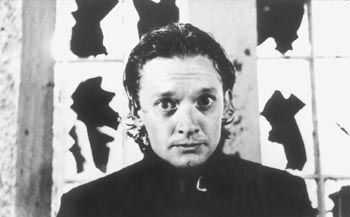![[MetroActive Movies]](/movies/gifs/movies468.gif)
[ Movies Index | Show Times | Santa Cruz Week | MetroActive Central | Archives ]
Night and the City: Douglas Henshall roams Glasgow after dark looking to reconnect with his grieving family.
Mum's the Word
Glasgow siblings mourn their dead mother all night in 'Orphans'
By Michael S. Gant
WHEN I SAW Reservoir Dogs in the theater, I found myself laughing alone at some of Quentin Tarantino's bloodier jests. I thought the severed ear was funny as hell, but nobody around me seemed to agree. The same brand of queasy humor is going to pose even more questions for audiences at Peter Mullan's Orphans. Mullan, a Scottish actor seen in My Name Is Joe and Trainspotting, has directed a bleak black comedy about an epically dysfunctional Scottish family that endures more trials than a carload of Jobs.
The action, which covers one stormy phantasmagorical night in Glasgow, begins at a funeral where three brothers--dutiful Thomas (Gary Lewis), sensitive Michael (Douglas Henshall) and hotheaded John (Stephen McCole)--and their disabled sister, Sheila (Rosemarie Stevenson), have gathered to offer their final good-byes to their mother. Afterward, at the local pub, Thomas sings a teary eulogy for dear old mum that evokes anything but sympathy from the boozy crowd. Michael challenges one heckler and ends up gut-stabbed for his troubles. As Michael lurches into the night leaking blood, John vows revenge while Thomas and Sheila return to the church, there to stand watch over mom's casket.
What starts as an updated kitchen-sink drama rapidly turns into a downward spiral of mishaps. When Thomas refuses Sheila's demand to be pushed home, the sister pilots her wheelchair into the night, only to get stuck in a dark alley. John and his cousin Tanga (Frank Gallaher), an embittered fast-food deliveryman, drive around in search of a gun, stopping along the way to terrorize a masturbating bad tipper and his clueless wife. Rather than go to the hospital, Michael hatches a scheme to get worker's compensation for his wound, which continues to spurt blood down his pant leg even though he's wrapped himself in plastic garbage bags. Thomas, meanwhile, prays fervently even as gale-force winds rip the roof right off the church.
It's about the time that that church roof goes spinning off like a special effect from Twister that Orphans is going to lose people. The scene in which an apoplectic bartender locks up some of his patrons only to have them escape and use his backside as a dart board makes the gimp-in-the-basement episode from Pulp Fiction look therapeutic by comparison, and the thickly accented dialogue (helpfully translated in subtitles) relies on the numbing repetition of a few obscenities. Careening from absurdist excess to serious soul-searching, the film suddenly stumbles to the finish line with an ending that implies--against all evidence--the possibility of reconciliation and even redemption. Mullan injects Orphans with some of the same hallucinogenic charge that made Trainspotting so invigoratingly horrifying, but he never establishes a rhythm strong enough to sweep viewers along on a wave of sheer audacity. Instead, he has created a Glasgow so dreary--full of sallow drunks, raging brawlers and foul-mouthed preteens--that any possibility of comedy, even the gallows kind, gets swamped by pure misery.
Copyright © Metro Publishing Inc. Maintained by Boulevards New Media.
![]()

Photograph by Alan Wylie
Orphans (Unrated; 110 min.), directed and written by Peter Mullan, photographed by Grant Scott Cameron and starring Gary Lewis, Douglas Henshall, Stephen McCole and Rosemarie Stevenson, opens Thursday at the Nickelodeon in Santa Cruz.
[ Santa Cruz Week | MetroActive Central | Archives ]
From the April 19-26, 2000 issue of Metro Santa Cruz.